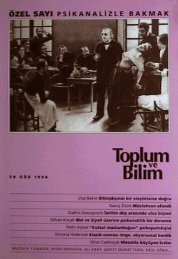Türk ve Japon ModernleÅmesi: 'Uygarlık Süreci' - Birikim
Türk ve Japon ModernleÅmesi: 'Uygarlık Süreci' - Birikim
Türk ve Japon ModernleÅmesi: 'Uygarlık Süreci' - Birikim
- No tags were found...
Create successful ePaper yourself
Turn your PDF publications into a flip-book with our unique Google optimized e-Paper software.
170BEDRİ GENCERThe historic dynamics of laicity in TurkeyIn this paper, it is pointed out that the concepts ‘nation’ and ‘state’ signify theunderlying dynamics of the process of Turkish laicization. Unlike the Anglo-Saxon concept of secularization involving a transformation in weltanschauung,Turkish laicization means the official disestablishment of religion, i.e. the exclusionof Islam from state affairs. This process of laicization was rooted in twoconcepts that run parallel to that which took place in the West. Roughly stating,nation, as opposed to community, denotes a modern, fictitious political entity.At this point, the Haldunian conception of esprit de corps (‘asabiyah) providesus a conceptual tool to explain this transformation. But, in the modern erawhat defied the Haldunian conception of ‘asabiyah, so far as the quasi-nationalisticsentiment was concerned, was its no<strong>ve</strong>l ideological character.The nationalistic ideas of French Revolution affected the multi-ethnicempires like the Ottoman Empire. The replacing of ‘community’ by ‘nation’ wasthe main shift in the ideological map of the Young Turks. Turkey was forcedinescapably to slant toward nationalism by stripping of its secondary loyaltiesdetermined by the historic zeal for Islamic cause. The Turkish nationalism displayeda critical difference from its Western counterpart: rather than a processof ‘nation-building’ based upon a cultural-civil-historic nationalism, the republicancadres led by Mustafa Kemal tried to form a new political identity, dri<strong>ve</strong>nby the secular, Kantian ‘duty ethics’.In the Turkish case, state, rather than nation, was considered to be the mainactor of laicization. In the course of the Western history, a modern, fictitioussubject, corporate body called State, emerged as an apparatus of power againstthe Church. During this process the search for natural law as an embodiment ofthe ontological conception of justice had already disappeared. Accordingly,man-made, positi<strong>ve</strong> law that emerged as a result of the triumph of the stateo<strong>ve</strong>r the church appeared to be the ‘law of state’.This was the <strong>ve</strong>ry case with the process of Turkish laicization, gi<strong>ve</strong>n the traditionaltop priority of the state. The Islamic law, being essentially a civil (quintessentially,belonging to the city) law, has nothing to do with such a corporatebody as state. Gi<strong>ve</strong>n this fact, the justification for a drastic mo<strong>ve</strong>ment of laiciza-





